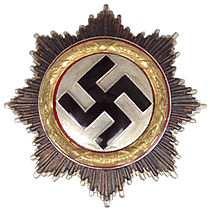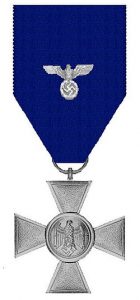Haccius, Ernst, born 10-12-1893 in Hanover,  entered the Army on 09-02-1914, age 20, as a Fahnenjunker in the Hannoversches Jäger-Battalion Nr. 10.
entered the Army on 09-02-1914, age 20, as a Fahnenjunker in the Hannoversches Jäger-Battalion Nr. 10. 
 With this Regiment Ernst was in the fields of the first war as a Leutnant and awarded with both the Iron Crosses
With this Regiment Ernst was in the fields of the first war as a Leutnant and awarded with both the Iron Crosses  . He remains in the new Reichswehr and at the beginning of World War II he was a adjutant in the General Command of the X Army Corps under command of General der Artillerie Christian Hansen
. He remains in the new Reichswehr and at the beginning of World War II he was a adjutant in the General Command of the X Army Corps under command of General der Artillerie Christian Hansen 

 , . Promoted to Oberst on 01-01-1940 and assigned to commander of the 65th Infantry Regiment. He received the German Cross in Gold
, . Promoted to Oberst on 01-01-1940 and assigned to commander of the 65th Infantry Regiment. He received the German Cross in Gold  on 27-10-1941 and promoted to Generalmajor on 20-04-1942, with the command of the 46th Infantry Division
on 27-10-1941 and promoted to Generalmajor on 20-04-1942, with the command of the 46th Infantry Division  , later succeeded by General der Gebirgstruppe, Carl von Le Suire
, later succeeded by General der Gebirgstruppe, Carl von Le Suire
 entered the Army on 09-02-1914, age 20, as a Fahnenjunker in the Hannoversches Jäger-Battalion Nr. 10.
entered the Army on 09-02-1914, age 20, as a Fahnenjunker in the Hannoversches Jäger-Battalion Nr. 10. 
 With this Regiment Ernst was in the fields of the first war as a Leutnant and awarded with both the Iron Crosses
With this Regiment Ernst was in the fields of the first war as a Leutnant and awarded with both the Iron Crosses  . He remains in the new Reichswehr and at the beginning of World War II he was a adjutant in the General Command of the X Army Corps under command of General der Artillerie Christian Hansen
. He remains in the new Reichswehr and at the beginning of World War II he was a adjutant in the General Command of the X Army Corps under command of General der Artillerie Christian Hansen 

 , . Promoted to Oberst on 01-01-1940 and assigned to commander of the 65th Infantry Regiment. He received the German Cross in Gold
, . Promoted to Oberst on 01-01-1940 and assigned to commander of the 65th Infantry Regiment. He received the German Cross in Gold  on 27-10-1941 and promoted to Generalmajor on 20-04-1942, with the command of the 46th Infantry Division
on 27-10-1941 and promoted to Generalmajor on 20-04-1942, with the command of the 46th Infantry Division  , later succeeded by General der Gebirgstruppe, Carl von Le Suire
, later succeeded by General der Gebirgstruppe, Carl von Le Suire
 . The 46th Infantry Division fought in the invasion of Poland in 1939, and then was held in reserve until May 1940, when it was transferred to France. The division fought in the Loire Valley until the fall of France. After the invasion of the Soviet Union, the division was involved in the assault on the Crimea late in 1941. While engaged in heavy fighting in the Kerch Peninsula in December, and with Soviet landings both at the tip of the Kerch Peninsula and at Feodosiya, the 42nd Corps commander, Generalmajor der Infanterie, Hans von Sponek
. The 46th Infantry Division fought in the invasion of Poland in 1939, and then was held in reserve until May 1940, when it was transferred to France. The division fought in the Loire Valley until the fall of France. After the invasion of the Soviet Union, the division was involved in the assault on the Crimea late in 1941. While engaged in heavy fighting in the Kerch Peninsula in December, and with Soviet landings both at the tip of the Kerch Peninsula and at Feodosiya, the 42nd Corps commander, Generalmajor der Infanterie, Hans von Sponek 
 gave the order to pull back. This order was countermanded by the 11th Army commander, Generalfeldmarschall, Erich von Manstein,
gave the order to pull back. This order was countermanded by the 11th Army commander, Generalfeldmarschall, Erich von Manstein, 
 but since von Sponeck had already disassembled his wireless set, the order to hold ground was not received. The 46th Infantry Division avoided encirclement and eventually helped stem the tide of the Red Army landings at Feodosiya. General von Sponeck was dismissed and subject to a trial in which Reichsmarschall, Hermann Göring
but since von Sponeck had already disassembled his wireless set, the order to hold ground was not received. The 46th Infantry Division avoided encirclement and eventually helped stem the tide of the Red Army landings at Feodosiya. General von Sponeck was dismissed and subject to a trial in which Reichsmarschall, Hermann Göring  oversaw the proceedings. General von Sponeck was sentenced to death but this order was commuted by Adolf Hitler and reduced to seven years imprisonment. When Feldmarschall, Walther von Reichenau
oversaw the proceedings. General von Sponeck was sentenced to death but this order was commuted by Adolf Hitler and reduced to seven years imprisonment. When Feldmarschall, Walther von Reichenau
 , Von Reichenau died in Poltawa of a stroke age 57, on 17-01-1942, took command of Army Group South, he relayed a message to the divisional commander, Generalleutnant der Infanterie, Kurt Himer,
, Von Reichenau died in Poltawa of a stroke age 57, on 17-01-1942, took command of Army Group South, he relayed a message to the divisional commander, Generalleutnant der Infanterie, Kurt Himer, 
 Himer died of wounds age 53, on 04-04-1942, which read “Because of its slack reaction to the Russian landing on the Kerch Peninsula, as well as its precipitate withdrawal from the peninsula, I hereby declare 46th Division
Himer died of wounds age 53, on 04-04-1942, which read “Because of its slack reaction to the Russian landing on the Kerch Peninsula, as well as its precipitate withdrawal from the peninsula, I hereby declare 46th Division  forfeit of soldierly honour. Decorations and promotions are in abeyance until countermanded. Signed: von Reichenau, Feldmarschall”. The 46th Infantry division was a part of 54th Army Corps, under the command of General der Artillerie, Christain Hansen.
forfeit of soldierly honour. Decorations and promotions are in abeyance until countermanded. Signed: von Reichenau, Feldmarschall”. The 46th Infantry division was a part of 54th Army Corps, under the command of General der Artillerie, Christain Hansen. 
 In March 1945, the division was renamed the 46th Volksgrenadier Division. With its numbers depleted, the division surrendered to the Soviets in May 1945.
In March 1945, the division was renamed the 46th Volksgrenadier Division. With its numbers depleted, the division surrendered to the Soviets in May 1945.Death and burial ground of Haccius, Ernst.



 Haccius was killed in battle with this division in the Kaukasus, age 49, 11-02-1943 and posthumous awarded with the Knight’s Cross of the Iron Cross and the rank of Generalleutnant. Haccius is buried in Kertsch, Russia, but there is a grave of honour for him in Goslar.
Haccius was killed in battle with this division in the Kaukasus, age 49, 11-02-1943 and posthumous awarded with the Knight’s Cross of the Iron Cross and the rank of Generalleutnant. Haccius is buried in Kertsch, Russia, but there is a grave of honour for him in Goslar.


























Leave a Reply